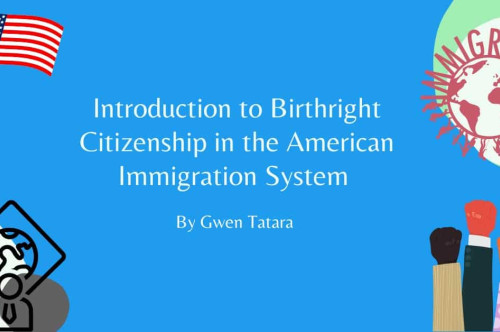
This piece was originally posted by the Alliance for Citizen Engagement (Center). It was written by Gwen Tatara.
Jus soli, or birthright citizenship, is the idea that those born in the U.S. are automatically considered citizens of the United States regardless of their parents’ citizenship. While birthright citizenship is often attributed to the 14th Amendment , the policy has recently sparked debate in political and legal circles, in part due to Donald Trump’s promise to issue an executive order ending birthright citizenship for those born to unauthorized parents during his presidency.
The Birthright Citizenship Act, introduced into the House of Representatives in 2021, would amend section 301 of the Immigration and Nationality Act to clarify who is subject to the jurisdiction of the United States and in turn, who is eligible for citizenship. An individual is subject to the jurisdiction of the U.S. when the United States government has the right to enforce its governing laws against a person. Under the Birthright Citizenship Act, automatic citizenship would only be granted to those who have a parent who is a:
- U.S. citizen or national
- lawful resident residing in the U.S.
- foreign national performing active service in the Armed Forces.
While the bill would not impact the citizenship or nationality status of any person born before the potential enactment date, it would mean all future children born in the U.S. to parents of both unauthorized immigrants and immigrants in the U.S. on a temporary visa are not guaranteed citizenship.
Major Legislation and Court Cases Relating to Birthright Citizenship
- The 14th Amendment: The 14th amendment is a piece of Reconstructionist Era legislation which ensures due process and equal protection under the law as well as citizenship for all those “born or naturalized” in the U.S. The amendment granted citizenship to groups previously excluded from this right, most notably African Americans, but some argue that the precedent should not extend to children of undocumented immigrants, as, at the time of the amendment’s passage, there was little context for illegal immigration.
- United States v Wong Kim Ark: In this 1898 Supreme Court case, the court ruled that Wong Kim Ark was a U.S. citizen because he was born in the United States, despite the fact that his parents could not become citizens due to the Chinese Exclusion Act. However, opponents of birthright citizenship argue this statute cannot apply to those with unauthorized parents because although Wong Kim’s parents were not citizens, they were documented. Opponents also point to the Slaughterhouse cases, in which the Supreme Court ruled that the phrase “subject to the jurisdiction of” was intended to exclude children of ministers, consuls, and citizens or subjects of foreign states, regardless of their birthplace.
Arguments in Favor of Birthright Citizenship
Advocates of existing birthright citizenship policy consider the practice to be a cornerstone of the United States as a nation of immigrants, and point to the practical and legal complications if birthright citizenship were to be restricted. One major difficulty is that many of those who gain citizenship due to their birthplace do not have citizenship to another nation and therefore cannot be deported as they lack the right of entry to their parents’ country of origin. As a result, many argue that altering birthright citizenship would create a legal crisis for those born into this situation and their family members. Additionally, following former President Trump’s promise to issue an executive order restricting birthright citizenship, many were quick to point to the 30 other countries who also offer citizenship to those born in their nation regardless of parent’s legal status. In countries without this practice, citizenship is often determined by descent and critics argue this is nearly impossible in a diverse nation like the U.S. Furthermore, critics of the act argue that current U.S. birthright citizenship policy enables children of unauthorized parents to receive the benefits of citizenship—including federal aid, civic rights, and legal protection—and they can use these resources to support the rest of their family networks. Above all, critics of the move to diminish this right view the policy as a staple of not only American immigration but American identity, as they argue birthright citizenship facilitates a sense of nationalism.
Arguments Against Birthright Citizenship
Those who support the Birthright Citizenship Act argue that current birthright citizenship policy perpetuates illegal immigration, as some believe that unauothrized parents may use their child with automatic citizenship to gain legal status themselves. The derogatory term “anchor babies” refers to this notion, and proponents of this idea point to statistics such as the Migration Policy Institute’s estimate that 4.1 million children had at least one undocumented parent in 2016. Additionally, opponents of existing birthright citizenship policy point to the net fiscal burden of unauthorized immigrants, which the NAS estimates to be $65,292 per immigrant. They argue that while unauthorized immigrants often have access and utilize public services like education, social care, and law enforcement, they do not have the same tax burdens that legal citizens do, and therefore citizens face higher taxes due to unauthorized immigrants living in the U.S.
Conclusion
A variation of this act has been introduced to numerous sessions of Congress beginning in 2007, and while the 2021 version is did not pass, it is indicative of a larger debate surrounding citizenship and legal status in this country. Controversy continues to surround the question of birthright citizenship’s application to those born in U.S. territories or out of wedlock, and questioning the legitimacy of an opponent’s citizenship due to their birthplace remains a popular smear tactic.











